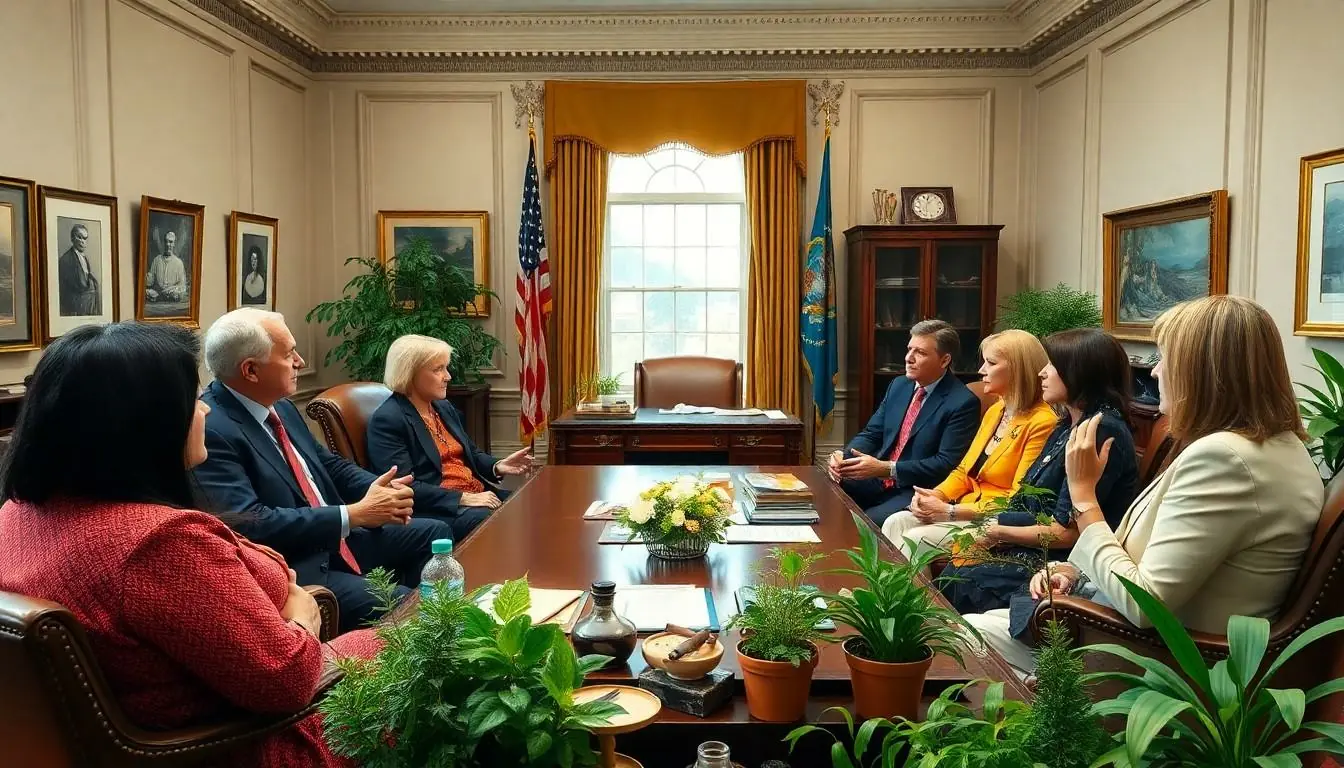In the heart of Capitol Hill, where politics often feels like a high-stakes game of chess, a quieter revolution is brewing—one that’s all about alternative medicine. Forget the usual debates over budgets and bills; this is where herbal remedies and holistic healing are stepping into the spotlight. It’s a place where acupuncture needles and essential oils might just have as much influence as lobbyists and lawmakers.
Table of Contents
ToggleOverview of Alternative Medicine on Capitol Hill
Alternative medicine has gained substantial traction on Capitol Hill in recent years. Herbal remedies and holistic healing practices now capture considerable attention among lawmakers. Acupuncture, for instance, is increasingly regarded as a viable option for pain relief, and many representatives advocate its inclusion in health care discussions. Essential oils, often celebrated for their therapeutic properties, also play a role in this growing dialogue.
Several members of Congress promote education on alternative therapies, recognizing their potential benefits for constituents. Research supports the efficacy of treatments such as chiropractic care and naturopathy, contributing to their legitimacy in political discussions. Policy proposals often include provisions encouraging the integration of these modalities within conventional health care.
Organizations focused on alternative medicine advocate vigorously for greater acceptance and research funding. They assert that comprehensive data could lead to improved patient outcomes and reduced health care costs. Legislative initiatives aim to protect practitioners and ensure that users have access to diverse treatment options.
Public interest in natural health solutions fuels this movement, as more citizens seek alternatives to pharmaceutical treatments. Surveys indicate that a significant number of Americans already utilize some form of alternative therapy. This widespread adoption puts pressure on policymakers to consider alternative medicine as a key aspect of health policy.
As Capitol Hill navigates issues surrounding health care reform, alternative medicine remains a pivotal topic. Stakeholders continue to push for recognition and support of these modalities in legislative frameworks, anticipating that integrative strategies can enhance overall well-being for the public.
Historical Context


The movement towards alternative medicine on Capitol Hill has deep roots, reflecting a shift in public interest towards holistic health approaches. This transformation is defined by a growing recognition of natural and non-traditional therapies.
Emergence of Alternative Medicine
Alternative medicine gained traction in the 20th century, alongside increased public awareness of health and wellness. Diverse practices such as acupuncture, chiropractic care, and naturopathy began to attract attention as viable options for treatment. Various studies have highlighted the effectiveness of these therapies, contributing to their rise within political discourse. Lawmakers saw a growing demand among constituents for more diverse health care options. An increasing number of Americans embraced herbal remedies and holistic practices, prompting Capitol Hill to respond to this paradigm shift.
Legislative Milestones
Key legislative milestones have marked the integration of alternative medicine into mainstream health care discussions. The Affordable Care Act of 2010 set a foundation for recognizing various non-traditional therapies. In subsequent years, legislators proposed numerous bills aimed at expanding coverage for alternative treatments, emphasizing their potential benefits. Advocacy groups actively pushed for greater funding for research to support alternative medicine. Recent proposals have called for incorporating these therapies into federal health programs, demonstrating the increasing acknowledgment of their significance in public health policy.
Current Trends in Alternative Medicine
Alternative medicine remains a significant topic on Capitol Hill, capturing the interest of various lawmakers and health advocates.
Popular Practices Among Legislators
Acupuncture, chiropractic care, and naturopathy stand out as preferred therapies among legislators. Lawmakers often promote acupuncture for its effectiveness in managing pain and reducing stress. Chiropractic care gains recognition for its role in addressing musculoskeletal issues, contributing to overall wellness. Natural remedies, including herbal medicine and essential oils, also attract attention for their perceived health benefits. These practices reflect a broader shift towards personalized health care solutions, resonating with constituents seeking holistic approaches. They increasingly influence policy discussions, highlighting a willingness to integrate these therapies into conventional medicine.
Research and Evidence
Research supporting alternative medicine continues to grow, solidifying its place in health care debates. Numerous studies showcase the effectiveness of acupuncture in treating chronic pain conditions, offering evidence that legislators find compelling. Naturopathy also benefits from research emphasizing its holistic approach to health, leading to increased credibility among policy makers. Advocacy groups play a crucial role by pushing for further investigations into these therapies. Funding demands for research drive the conversation, shaping public perception and potential policy changes. Legislators frequently reference this evidence, advocating for the inclusion of alternative therapies within standard health care frameworks.
Challenges Facing Alternative Medicine
Alternative medicine encounters several challenges on Capitol Hill, influencing how its integration unfolds. Regulatory issues and public perception significantly impact its growth.
Regulatory Issues
Regulatory frameworks often lag behind the increasing interest in alternative therapies. Agencies like the FDA oversee products, yet many alternative treatments lack robust guidelines. Herbal remedies and supplements, for instance, may not receive the same scrutiny as conventional medications. This discrepancy raises concerns about safety and efficacy. Policymakers strive to create regulations that ensure public safety while promoting access to alternative medicine. Legislative efforts aim to establish clearer guidelines for practitioners and products, allowing broader acceptance in health care systems.
Public Perception
Public perception plays a crucial role in the acceptance and support of alternative medicine. Many individuals view these treatments as beneficial, prompted by personal experiences and anecdotal evidence. Skepticism persists, particularly among traditional medical practitioners and some consumers. Misconceptions about the effectiveness of alternative therapies can hinder their integration into mainstream health care. Advocacy groups work diligently to combat misinformation by promoting evidence-based research that highlights the benefits of various practices. Legislative support often aligns with changing public attitudes, indicating a potential shift toward greater acceptance of alternative medicine.
Future of Alternative Medicine on Capitol Hill
The landscape for alternative medicine on Capitol Hill continues to evolve, reflecting broader changes in public health perspectives. With lawmakers increasingly open to non-traditional therapies, new legislation might soon emerge.
Potential Legislation
Expected legislative moves aim to expand coverage for alternative medicine. Proposed bills focus on integrating therapies like acupuncture and chiropractic care into federal health programs. Support for legislation has been bolstered by growing research that showcases these treatments’ effectiveness. Many lawmakers recognize the potential cost savings associated with preventive alternative therapies as they capture the attention of health advocates. If all goes according to plan, the future legislative environment may include clearer guidelines to facilitate broader access to these therapies.
Advocacy Efforts
Advocacy groups play a pivotal role in promoting alternative medicine on Capitol Hill. They actively lobby for increased funding to support research that validates the benefits of these practices. Campaigns designed by advocates aim to clarify misconceptions surrounding alternative therapies, highlighting their effectiveness through evidence-based approaches. Strong engagement with constituents helps lawmakers understand the demand for diverse health care options. Organizations are rallying support from key stakeholders to ensure these treatments receive the recognition they deserve in health policy discussions.
The alternative medicine movement on Capitol Hill signifies a notable shift in health care discussions. As lawmakers embrace holistic approaches and advocate for diverse treatment options, the integration of therapies like acupuncture and chiropractic care continues to gain momentum.
With increasing research supporting the efficacy of these practices, public interest is likely to grow. Advocacy groups remain essential in driving this change, ensuring that alternative medicine receives the attention it deserves.
As perceptions evolve and regulatory frameworks adapt, the future of alternative medicine in public policy looks promising, potentially reshaping the landscape of health care for many Americans.





